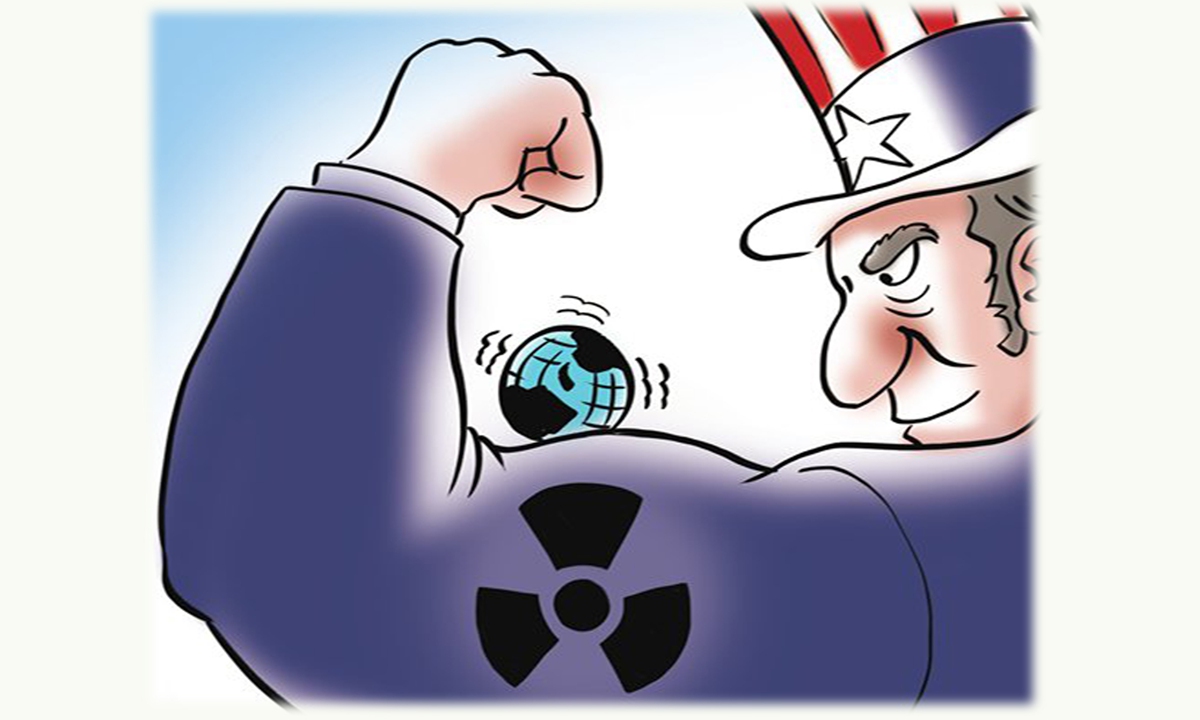
Illustration: Liu Rui/GT
Von Jackson, an expert at the Centre for Strategic Studies at Victoria University of Wellington in New Zealand and a former policy adviser to the Office of the US Secretary of Defense, recently published an article arguing that the US should adopt a "no first use" nuclear policy.Such opinion is not surprising. Nuclear strategy is an area where the Biden administration differs sharply from the Trump administration. The Trump administration's customized deterrence nuclear strategy emphasized flexible responses and winning wars. Biden's team has returned to the Obama administration's proposition of strategic stability and pure deterrence in this regard. During the campaign, Joe Biden stated that "the sole purpose of the US nuclear arsenal should be deterring - and if necessary, retaliating against - a nuclear attack." This has rekindled hope among arms control advocates of reducing the role of nuclear weapons in national security policy.
Policy on the use of nuclear weapons is an important part of nuclear strategy. It is often adjusted with the change of political parties. The Obama administration declared that the US would consider the use of nuclear weapons only in "extreme circumstances" and pledged to gradually reduce their role in deterring non-nuclear attacks. The Trump administration has lowered the threshold for the use of nuclear weapons and expanded the scope of nuclear deterrence.
The Biden administration is likely to revive the Obama administration's use of nuclear weapons as a last resort in extreme scenarios. Whether it makes an explicit commitment not to retaliate against space, cyber and biological attacks with nuclear weapons depends on the result of the game between the various forces.
For Biden, to go further than the Obama administration and adopt a "no first use" policy, there are two major obstacles. First, it will face strong resistance from the "nuclear umbrella" states, such as Japan. Tokyo fears that Washington's pledge not to be the first to use nuclear weapons will undermine the credibility of the "nuclear umbrella." This will mean Japan may face nuclear threats directly from China and North Korea. Second, conservative forces in the US believe that not using nuclear weapons first is a propaganda ploy by communist countries, and the US should not comply to it. They say that the "no first use" policy is empty talk that is incredible. For example, the Soviet Union promised "no first use," but documents released after the collapse of the Soviet Union showed that it had always been prepared to use nuclear weapons for a first strike.
So, is "no first use" policy just an empty talk? Not at all. A country that pursues a "no first use" policy does not need to hoard nuclear weapons on a large scale in order to destroy an opponent's nuclear force in a first strike. It only needs to maintain a smaller nuclear arsenal for counterattack. If a country pursues a "no first use" policy, it will not use or threaten to use nuclear weapons against non-nuclear-weapon states. This reduces the risk of a nuclear arms race, and also the risk of an escalation of a nuclear conflict caused by a mis-launch. If it's just an empty talk, why is Washington struggling with whether to adopt a "no first use" policy?
If it is just an empty talk, why has a slight change in the wording with China's policy on the use of nuclear weapons created nervous paranoia in the US strategic community?
Before all nuclear weapons are phased out or abolished, the "no first use" policy is the most responsible policy. It is conducive to reducing the role of nuclear weapons. It ultimately creates conditions for the realization of a world free of nuclear weapons. It is welcomed by the vast number of non-nuclear-weapon states. Therefore, China has long adhered to the policy of "no first use" of nuclear weapons to provide security assurances to non-nuclear-weapon states.
Theoretically speaking, if the Biden administration is serious about adopting a no-first use policy, the constraints from the "nuclear umbrella" states and the opposition from domestic conservatives will not be a problem. "No first use" is not the patent of a communist country. In fact, the US once had a "no first use" of biological weapons policy as well. But given the US' paranoia about the great power competition and the factional nature of US domestic politics, it will be hard for the Biden administration to take that step.
The author is director of Arms Control Studies Center, China Institutes of Contemporary International Relations. opinion@globaltimes.com.cn
